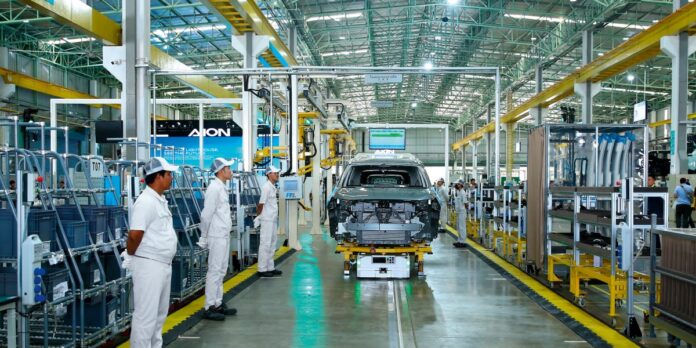Narong Yuenyonghattaporn, a retired civil servant in Bangkok, purchased an electric car made by GAC Aion earlier this year. He is part of a growing group of Thai drivers opting for EVs manufactured by Chinese car companies but produced in Thailand, a country that has become a key player in the global auto market competition.
Over the last two years, Chinese automakers such as BYD, GAC Aion, and Chery have announced their intentions to establish manufacturing plants in Thailand. The factories of BYD and GAC Aion have started operating in July, with Chinese investments in Thai auto facilities totaling at least $1.4 billion.
The EV owned by Narong is one of the 80,000 battery-electric vehicles projected to be registered by the Electric Vehicle Association of Thailand this year. In the previous year, Thailand registered 76,739 BEVs, which is 6.5 times more than in 2022, based on government data.
Despite the slowdown in EV adoption in Thailand this year and globally, Chinese car companies, spearheaded by BYD, are making a move into markets traditionally dominated by Japanese, American, and German automakers. These Chinese brands, particularly EV manufacturers, have been expanding internationally since around 2020 in pursuit of increased revenue amid tough competition and oversupply in their domestic market.
Due to challenges in Europe and North America, Chinese automakers are aggressively targeting middle-income markets like Thailand, Indonesia, Brazil, Malaysia, and Argentina where there are fewer domestic auto competitors and governments maintain cordial relations with Beijing.
In Thailand, Chinese EV manufacturers are beginning to rival long-standing Japanese brands in the local auto market. With an abundance of showrooms featuring Chinese vehicles, large billboards along highways, and production facilities within a short drive of Bangkok, Chinese manufacturers are poised to ramp up production to at least 320,000 vehicles per year when fully operational.
Thailand, with its favorable relations with China and an established auto supply chain, serves as an appealing market for Chinese manufacturers, according to Eugene Hsiao, head of China equity strategy at Macquarie. The country’s central position in Southeast Asia and significant domestic automotive market further contribute to its attractiveness.
Just like in Thailand, Chinese auto companies are investing globally to assemble vehicles in-country to benefit from incentives or avoid tariffs. Various nations, such as Brazil, Hungary, and Malaysia, offer tax exemptions and incentives to promote EV adoption and local production.






